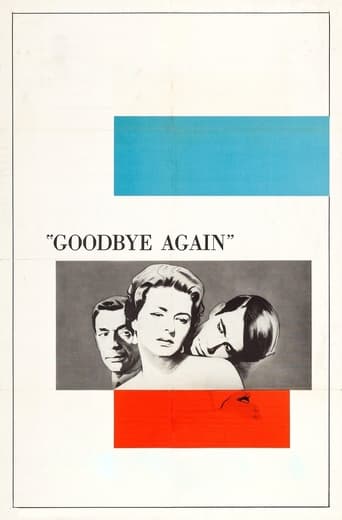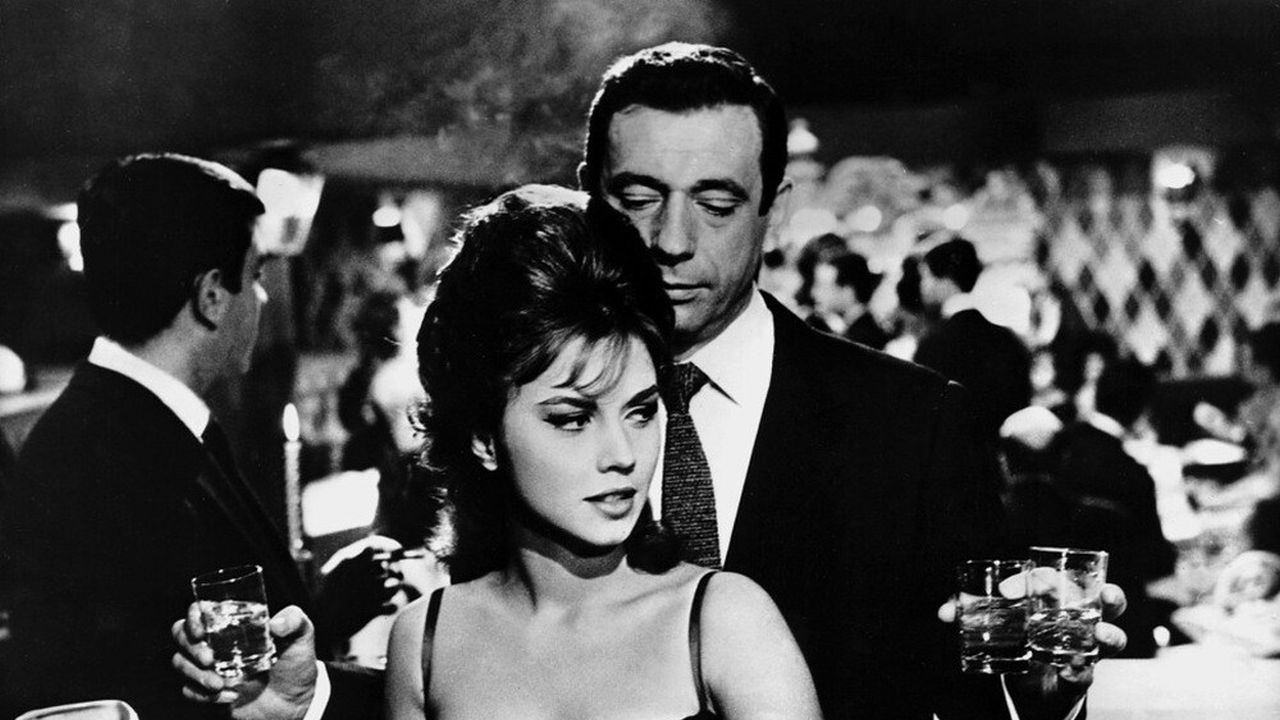Carl Ian Schwartz
A literate script and excellent acting and direction elevate this love triangle to art.One of the best scenes, late in the picture, takes place on the dance floor of Maxim's and has NO dialog--just facial expressions culminating in a touching of hands.The original French title, "Aimez-vous Brahms?", is reflected here in the use of Brahms's Third Symphony. Again, the feeling is conveyed by the music and the facial expressions of the actors. This music, long familiar to me, took on a new meaning.This is a film made by adults for an adult audience--a 40-year-old audience will appreciate it, a younger audience will not.
blanche-2
Ingrid Bergman stars in 1961's "Goodbye Again" along with Yves Montand, Tony Perkins and Jessie Royce Landis. The setting is Paris, and Ingrid plays Paula, a 40-year-old designer carrying on a five-year affair with Roget (Montand) that is less than satisfactory much of the time - for one thing, he is promiscuous. However, they have a codependent relationship and breaking off with him is difficult. Finally, though, she does it, turning to a younger man, Philip (Perkins), who is madly in love with her.Based on a novel by Francoise Sagan, Ingrid Bergman does a beautiful job as Paula, playing the role with great emotion and depth and, as usual, she makes it look effortless. You can well understand why Philip would fall for her, but one has trouble understanding why Roget would want anyone else. As usual, whoever cast the film had no understanding of what an older woman finds attractive in a younger man. With perhaps two exceptions - both versions of "The Roman Spring of Mrs. Stone" - the casting is terrible in these May-December romance plots where the woman is older. Someone on the board suggested Robert Redford - undoubtedly, the person who suggested him is not a casting director. Normally, the "younger man" is TOO young and/or too boyish, so it seems almost mother-son - the beautiful Linda Gray playing opposite Christopher Atkins on "Dallas" is a great example. A role like Philip requires someone younger, yes, but sexy and masculine. This is not a criticism of Tony Perkins, a fine actor, but rather how the role was cast.Several people mentioned having a good cry over this film. I confess I had no urge to cry. I was frustrated as hell, though, that Paula could not break the cycle of codependency. Frankly, it's hard to feel sorry for people who put themselves through that type of emotional abuse - it's sad the first time, but when they continue doing it, it's annoying. Several people also used the word "independent" to describe Paula. Paula is not independent. She is codependent. My heart did go out to Philip. As for Roget - Montand was excellent, and the less said about his character, the better.Unfortunately, men like Roget exist, and there are still women like Paula who, with a chance to make a positive change, don't. There's something about the "prize" that's just out of grasp that must be very satisfying. Kudos to Bergman for showing us the emotional price to be paid.
Ed Uyeshima
It amazes me to find out that Anthony Perkins won the Cannes Film Festival Best Actor award for his skittish, petulant performance as Philip, the aimless, lovestruck "younger man" in this 1961 Paris-set soap opera about a May-September romance with Paula, a successful, fortyish interior decorator ensnared in a going-nowhere relationship with Roget, an age-appropriate transportation businessman who has casual affairs with young women he dubs impersonally as "Maisie". Naturally, Roget takes Paula for granted, which leaves her vulnerable to Philip's flirtatious advances. However, Perkins is an actor intractably tethered to his definitive role as Norman Bates in Alfred Hitchcock's "Psycho", and unfortunately in his first follow-up film, he emits such a creepy, obsessive tone that makes you fear more for Paula's life than her heart.On the upside is Ingrid Bergman's textured performance as Paula, and her mature beauty seems to reflect perfectly her saturnine situation. She is believably matched with Yves Montand as Roget in a performance that seems to echo his real-life situation with wife Simone Signoret when he embarked on a well-publicized affair with Marilyn Monroe the year before. Jesse Royce Landis shows up in her typical role as a pompous society matron, this time Philip's cheapskate mother, while Diahann Carroll shows up in a disposable cameo as a world-weary jazz chanteuse. Director Anatole Litvak paces the film a bit too leisurely and adds some silly but amusing touches like Paula's delusion of rain as she drives during a crying jag, but he creatively uses a circular structure to his plot by beginning and ending the film with almost the same scene. Adapting Francoise Sagan's "Aimez-vous Brahms?", screenwriter Samuel Taylor lends the sort of wry observations he contributed to his scripts for "Sabrina" and "Vertigo". As of March 2008, this film is not available on DVD.
Gerry Scott-Moore
Came in on this 30 minutes late yesterday, with no adolescent experience from yesteryear to back reference, I found it amazingly sappy, and inexplicably magnetic. I couldn't believe I would watch the rest, but did! Perhaps it's Paris, perhaps it's Bergman's effortless magnetism. It's not that she's so lovely or desirable--it's that she's so honest.An actress of this much grace is worthy of something more useful than the milksop of Anthony Perkins as Philip. Sure, he's supposed to be dense, naive and a mama's-boy. And at this point in time Perkins was being worked as a leading man he never became. For good reason. There's no substantive distinction between this role and his role in Psycho. Opaque. His smile/smirk frozen, false and inscrutable. In initial courting he really does come off more oppressive and menacing than lovelorn. The "light switch" scene: I'm not sure if he's going to kiss her or kill her.Oh, if only they had cast a believable actor. The scenes where he stops going to work have no veracity at all. He is a wooden marionette. Montand does his Montand thing but it's direct and simple anyway. No significant hopeful would have taken the second role of dumpee, but if Philip had been played by a young Redford-type this movie could have been much more.I've loved that Brahms piece for years so it was amazing to hear it singled out with such fury as a plot element, and the continual thematic variations in the background. A bit heavy- handed but appreciated.Many of the last few scenes are just delicious. The "viewed-from across the floor" scene during Philips resignation celebration was completely believable, despite it's melodrama. And that hang-dog look that Bergman gets--who could guess she could wear that kabuki mask believably!?The real gems are all in the last 15 minutes. The ending itself is stunningly modern for the tone of this movie. Honest and direct and unflinching. I had heard of the make-up removal scene before but it was beautiful to watch.


 AD
AD






